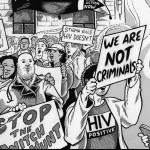Daniel Downer, 35, is thriving as the executive director of Bros in Convo, a self-described “Black, queer-led grassroots org-building community” dedicated to “educating and empowering gay and queer individuals of color living in Central Florida.”
Downer speaks with excitement about the many services his group offers, which will soon include a harm reduction education workshop for people who use drugs during sex, also known as chemsex. “We want to share tools with folks on how they can have safer fun, rather than say ‘You need to stop,’” Downer explains.
And that’ll be in addition to the resources Bros in Convo has been offering since it launched in 2017. Those include Be Kind to Your Mind, a monthly gathering during which participants discuss mental health and wellness. “It’s an affordable option for people who can’t access a therapist,” Downer says.
The organization also offers a support group for transgender and nonbinary folks; a health and nutrition program providing fresh local produce, cooking supplies and food-prep classes; testing for HIV, hepatitis C and other sexually transmitted infections; and a drop-in space called Stafford House. (It’s named for Lowell Stafford, a Black gay man who started an early HIV services group in the Orlando area.)
But back in 2012, when Downer had no insurance and was diagnosed with HIV, he was the one who needed support. Thankfully, there was the AIDS Drug Assistance Program (ADAP) within the Ryan White CARE Act, a long-running federal/state program that ensures that income-eligible people living with HIV get the free medications and medical care they need if they are uninsured or underinsured.
In many states, the program also assists with other key needs for HIV-positive people, including housing, nutrition and transportation. ADAP covers more than 300,000 individuals—about a third of all HIV-positive Americans.
Most state ADAPs offer clients two options. Clients without private insurance can be connected directly to HIV-specific meds and care only, while clients with insurance can have their premiums and often cost-sharing, like deductibles and co-pays, covered on private comprehensive health plans, such as job-linked plans, COBRA plans or Affordable Care Act (ACA, or Obamacare) health insurance marketplace plans.
Via ADAP, says Downer, “I went on meds right away and had no issues with access. My care was very coordinated and seamless.” When he needed to switch regimens due to side effects, it was no problem.
At that time, he explains, he was living in Georgia and was enrolled in the kind of ADAP that covers only meds and care directly related to HIV. When he moved to the Orlando area, he enrolled in an ACA marketplace plan (Bros in Convo does not provide health insurance), for which ADAP covers the roughly $1,000 monthly premiums.
The fact that ADAP picks up such a big monthly bill makes it possible for Downer to do the work he does, he says. And he appreciates having a real health plan that covers all his needs. “I know how restrictive traditional ADAP [that only covers HIV-related needs] can be,” he says, “so I appreciate that now I have a lot more autonomy when it comes to receiving comprehensive care.”
His ACA platinum plan—the ACA’s highest level of plans—“allows me to receive dental care, to see an optometrist and to visit a urologist, which is really important to me as someone who has a family history of prostate cancer.”
He adds, “I’m so glad that ADAP covers my health care. It’s opened a lot of options for me when it comes to accessing health care services.”







2 Comments
2 Comments